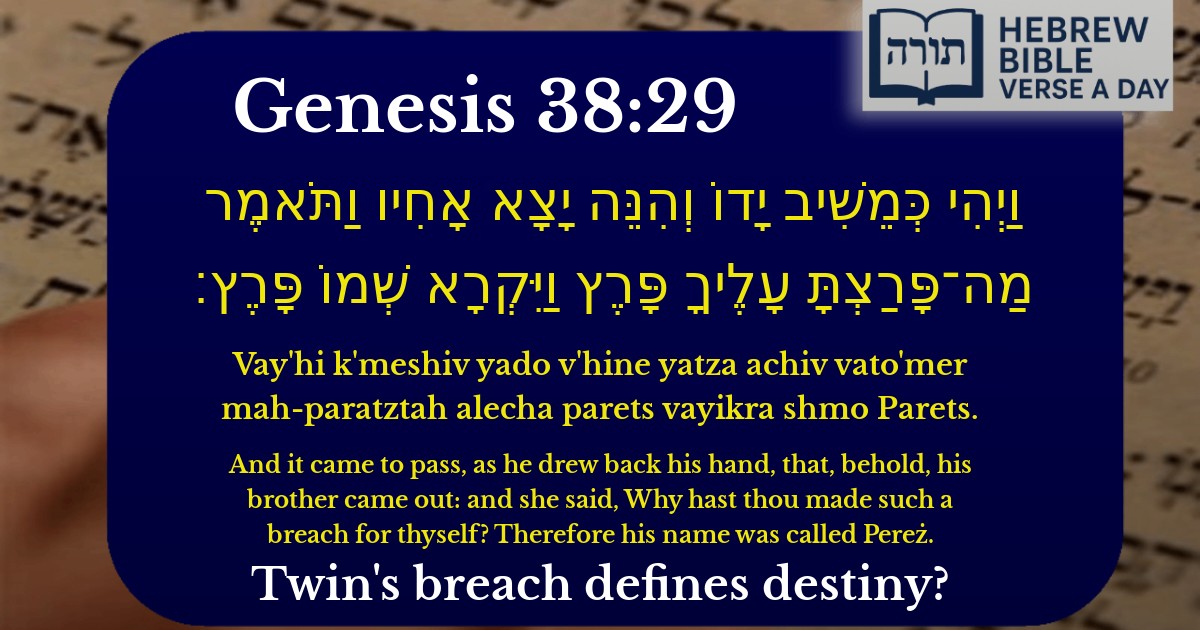Join Our Newsletter To Be Informed When New Videos Are Posted
Join the thousands of fellow Studends who rely on our videos to learn how to read the bible in Hebrew for free!
Hebrew Text
וַיְהִי כְּמֵשִׁיב יָדוֹ וְהִנֵּה יָצָא אָחִיו וַתֹּאמֶר מַה־פָּרַצְתָּ עָלֶיךָ פָּרֶץ וַיִּקְרָא שְׁמוֹ פָּרֶץ׃
English Translation
And it came to pass, as he drew back his hand, that, behold, his brother came out: and she said, Why hast thou made such a breach for thyself? Therefore his name was called Pereż.
Transliteration
Vay'hi k'meshiv yado v'hine yatza achiv vato'mer mah-paratztah alecha parets vayikra shmo Parets.
Hebrew Leining Text
וַיְהִ֣י <b>׀</b> כְּמֵשִׁ֣יב יָד֗וֹ וְהִנֵּה֙ יָצָ֣א אָחִ֔יו וַתֹּ֕אמֶר מַה־פָּרַ֖צְתָּ עָלֶ֣יךָ פָּ֑רֶץ וַיִּקְרָ֥א שְׁמ֖וֹ פָּֽרֶץ׃
וַיְהִ֣י ׀ כְּמֵשִׁ֣יב יָד֗וֹ וְהִנֵּה֙ יָצָ֣א אָחִ֔יו וַתֹּ֕אמֶר מַה־פָּרַ֖צְתָּ עָלֶ֣יךָ פָּ֑רֶץ וַיִּקְרָ֥א שְׁמ֖וֹ פָּֽרֶץ׃
🎵 Listen to leining
Parasha Commentary
📚 Talmud Citations
This verse is quoted in the Talmud.
📖 Sotah 36b
The verse is referenced in the context of discussing the birth of Peretz and Zerach, illustrating the miraculous nature of their birth and the significance of their names.
📖 Berakhot 60a
The verse is mentioned in a discussion about divine providence and the naming of children, highlighting the moment of Peretz's birth and the meaning behind his name.


Context of the Verse
This verse (Bereshit 38:29) describes the birth of Peretz, one of the twin sons of Yehuda and Tamar. The verse occurs during the dramatic moment of the twins' birth, where one child (Zerach) initially extends his hand, but Peretz emerges first, leading to his name being associated with "breaking through" (פרץ).
Rashi's Commentary
Rashi explains that the midwife tied a scarlet thread around Zerach's hand when it emerged first, marking him as the firstborn. However, Peretz "broke through" (פרץ) and was born before his brother, demonstrating his forceful nature. The name "Peretz" reflects this act of breaking through boundaries, symbolizing strength and initiative.
Midrashic Interpretation
The Midrash (Bereshit Rabbah 85:13) elaborates that Peretz's birth foreshadowed the future greatness of his descendants, particularly King David and Mashiach, who would come from his lineage. The "breach" (פרץ) represents the breaking of conventional expectations, as David—a descendant of Peretz—would rise from an unexpected background to kingship.
Rambam's Perspective
While Rambam does not directly comment on this verse, his principles of hashgachah pratit (divine providence) can be applied here. The unusual circumstances of Peretz's birth highlight divine orchestration in ensuring the continuity of the Davidic line, which was essential for Jewish leadership and redemption.
Symbolism of the Name "Peretz"
Halachic Implications
The Gemara (Sotah 10b) discusses whether Peretz or Zerach was halachically the firstborn, given the unusual birth. The conclusion is that Peretz was considered the firstborn despite Zerach's hand emerging first, as the birth itself determines status. This ruling underscores the Torah's emphasis on actual events over appearances.